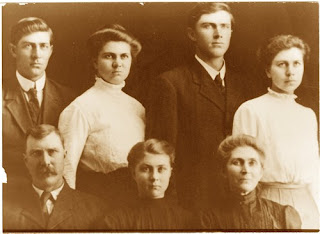Family Tree Magazine recently released their annual
101 Best Web Sites for 2009. You probably have seen most already, but I wanted to add those that I think are perfect to this blog.
10 Best Web Sites for Vital Records
Arizona Genealogy Birth and Death Certificates For any of those whose ancestors were born or died in Arizona are very lucky. Not only can you search here for birth records (1855 to 1933) and death records (1844 to 1958), but once you've found your family members, a single click brings up a PDF of the original document.
Cook County, Illinois, Vital Records $ This new Web site makes finding your Chicago-area ancestors a snap: Searching the more than 8 million birth (75-plus years old), marriage (50-plus years old) and death (20-plus years old) records is free. The results show name, record date and file number, with an option to download a copy for $15.
If you happen to be confused by sound-alike names here? You can use the search tool created by genealogy-tech guru Steve Morse at stevemorse.org/vital/cook.html.
Maine State Archives This archives site serves up a searchable marriage index (1892 to 1996, with a gap from 1967 to 1976) and death index (1960 to 1996).
Massachusetts Archives This is a searchable database that lets you search indexes of Massachusetts birth, marriage and death records from 1841 to 1910. You can search by first and last names, year and location. Be sure to bookmark this site, too, its ongoing project to index more than 1 million immigrants through the port of Boston (1848 to 1891).
Minnesota Historical Society Yea.. alot of my family lived in Minnesota. Here you can search your ancestors in the Land of 10,000 Lakes and a million mosquitoes with the indexes to birth records (1900 to 1934, plus selected pre-1900 records) and records from death cards (1904 to 1907) and death certificates (1908 to 2001).
Nova Scotia Historical Vital Statistics $ This site covers 111,386 births (1864 to 1877), 94,933 delayed birth records (1836 to 1907), 12,043 marriage bonds (1763 to 1864), 211,617 marriage registrations (1864 to 1932), 53,835 deaths from 1864 to 1877, and 392,787 deaths from 1908 to 1957. Every name is linked to the original digitized record. Searching and viewing is free, and you can order e-copies ($9.95) or paper copies ($19.95). To bad I have no family there.
Michigan This new site stands out for its Library of Michigan collection of nearly 1 million Michigan death certificates, 1897 to 1920—particularly notable because a readily available statewide index for the years 1915 to 1920 didn't exist previously. But these digitized records go far beyond a mere index, giving you the decedent's birth date and place, parents' names and birthplace, cemetery name and location, and more
.
South Dakota Department of Health Even though South Dakota didn't begin statewide birth records until 1905, people born before that date were allowed to file for delayed birth certificates. So don't be put off by the apparent four-year span of the database, which covers births from 100 years ago and earlier—more than 180,000 South Dakota births in all.
Utah Death Certificate IndexIf your ancestors died in Utah, you can find them in this searchable database of more than 250,000 death certificates, from 1904 to 1956, linked to images of the originals.
Western States Historical Marriage Records Index This ever-growing database now numbers more than 686,000 marriages, including most pre-1900 nuptials plus many later ones for Arizona, Idaho and Nevada. Also worth a look for marriages in California, western Colorado, Montana, Oregon, Utah, eastern Washington and Wyoming. New Mexico marriages from the 1700s are being added. I have ancestors that married and lived in this area also.









